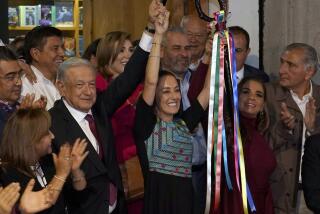Castro Points to His Brother as Successor
- Share via
HAVANA — It came as no surprise when Fidel Castro was unanimously reelected president of the Communist Party of Cuba on Friday evening at the close of its fifth national congress since he came to power 38 years ago.
It’s what happened next, after Castro’s brother Raul, 66, was reelected as the nation’s second-highest official, that set longtime party watchers here abuzz.
Castro, 71, placed his hand on his brother’s shoulder and, with the Spanish word that relay runners use when they pass the baton, dubbed Raul an excellent relevo, or “relief.”
“Through history and through his own personal merits,” Castro then told the 1,482 party delegates, the reelection of Raul as No. 2 “gives us a great deal of tranquillity and security for the future.”
Amid widespread speculation, false rumors and genuine concern here about Castro’s health, the gray-bearded leader addressed a subject the party congress had not in its sessions.
That subject was party succession.
Although Raul Castro has been the party’s second in command since its first congress, in 1975, the president had never before used the word “relief” to describe his younger brother.
But Castro’s long-winded appearance at the congress put to rest any immediate questions about his health. Just weeks after rumors that Castro had died swept through the huge Cuban exile community in Miami, the party president stood erect and spoke nonstop for six hours and 43 minutes Wednesday, with neither a script nor a bathroom break.
His speech, which the party officially dubbed “critical, exhaustive and analytical,” went beyond a theatrical rendering of the hardships and adjustments forced on his strident regime by a U.S. trade embargo--especially after the Soviet Union and its aid disappeared six years ago. Castro lucidly dissected Cuba’s limited economic reforms, recalling such details as the $200 million generated by the country’s new, semiprivate farmers markets.
Castro was noticeably thinner than in the past, however, and his voice was not quite as firm.
As his public appearances have declined in recent years, analysts inside and outside Cuba have speculated about who could replace the man synonymous with the Cuban Revolution--and when.
Friday night’s imagery left no doubt that Raul Castro, who has served as defense minister, as first vice president of the Council of State and as second secretary of the Communist Party for 32 years, is, in fact, Castro’s chosen successor.
Last week’s three-day congress, however, focused on far more immediate issues. It produced few surprises for the outside world--it chose a smaller and younger Central Committee and adopted several resolutions to usher in a more efficient Communist government--but it did navigate the critical thin line the party must walk between party ideology and the outside market forces the country must deal with to survive.
Most Cubans were eager to find out about the resolutions affecting recent reforms. Those resolutions were not published Saturday, but state-run media reported something of what both Fidel and Raul Castro had to say about them.
“Before, the problem was motherland or death. Now we have to be soldiers of the economy,” Castro said during an economic debate Friday. “The blind laws of the market will not rule in Cuba, although that does not mean that we might not apply the [economic laws] that are needed.”
And Raul Castro added: “What happened in the USSR or the countries of Eastern Europe will never happen here.”
More to Read
Sign up for Essential California
The most important California stories and recommendations in your inbox every morning.
You may occasionally receive promotional content from the Los Angeles Times.













